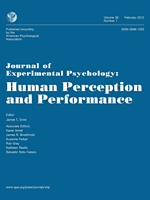
JOURNAL OF EXPERIMENTAL PSYCHOLOGY-HUMAN PERCEPTION AND PERFORMANCE
Scope & Guideline
Unveiling the intricacies of human cognition and performance.
Introduction
Aims and Scopes
- Human Perception:
The journal emphasizes research on sensory perception, including visual, auditory, and tactile modalities, exploring how individuals perceive, interpret, and respond to stimuli in their environment. - Cognitive Processes:
It investigates cognitive processes such as attention, memory, decision-making, and multitasking, aiming to understand the underlying mechanisms that drive human cognition and how these processes interact. - Performance Measurement:
The journal publishes studies that measure and analyze human performance across various tasks, providing insights into factors that enhance or impair performance in different contexts. - Multisensory Integration:
A core area of focus is the integration of information across different sensory modalities, examining how sensory inputs combine to influence perception and decision-making. - Individual Differences:
The journal also explores how individual differences, such as cognitive abilities, personality traits, and experiences, impact perception and performance outcomes. - Experimental Methodologies:
It employs a variety of experimental methodologies, including behavioral experiments, eye-tracking, neuroimaging, and computational modeling, to investigate complex psychological phenomena.
Trending and Emerging
- Dynamic Interaction of Cognitive Processes:
There is a growing emphasis on understanding how different cognitive processes, such as attention and memory, dynamically interact during tasks, highlighting the complexity of cognitive functioning in real-world scenarios. - Contextual and Environmental Influences:
Research increasingly focuses on how contextual factors and environmental cues influence perception and decision-making, reflecting a shift towards understanding behavior in naturalistic settings. - Neuroscientific Approaches:
An emerging trend is the integration of neuroscientific methods, such as neuroimaging and electrophysiology, to explore the neural underpinnings of perception and cognitive control, providing a deeper understanding of the biological basis of these processes. - Mind Wandering and Attention Control:
Studies investigating the relationship between mind wandering and attentional control are gaining traction, emphasizing the significance of understanding how spontaneous thoughts affect cognitive performance. - Multisensory and Crossmodal Research:
There is a marked increase in research on multisensory integration and crossmodal processing, exploring how different sensory modalities interact to shape perception and behavior. - Individual Differences in Perception and Performance:
Emerging themes include a focus on how individual differences, such as personality traits, cognitive styles, and previous experiences, influence perceptual and performance outcomes, indicating a personalized approach in psychology research.
Declining or Waning
- Static Visual Perception:
Research focusing solely on static visual perception without considering dynamic or contextual factors has decreased, indicating a shift towards more complex and ecologically valid studies that account for real-world variability. - Traditional Cognitive Tasks:
The use of traditional cognitive tasks in isolation, such as simple reaction time or basic memory tasks, is declining as researchers increasingly favor more integrative approaches that combine multiple cognitive processes. - Overly Generalized Theories:
There appears to be a waning interest in overly generalized theories of perception and cognition that do not account for contextual or individual differences, as the field moves towards more nuanced and specific models. - Basic Sensory Processing Studies:
Studies focusing on basic sensory processing without linking to real-world applications or cognitive implications are becoming less frequent, reflecting a trend towards research that emphasizes practical relevance. - Lack of Ecological Validity:
Research that lacks ecological validity or fails to consider real-world implications of findings is less prevalent, as the journal encourages studies that bridge the gap between laboratory findings and everyday experiences.
Similar Journals

MUSIC PERCEPTION
Unraveling the Mysteries of Musical InfluenceMUSIC PERCEPTION is a prestigious academic journal dedicated to the interdisciplinary exploration of musical experience and understanding. Published by the University of California Press, this journal has established itself as an essential resource in the field of music psychology, with a strong emphasis on how auditory stimuli influence human cognition and emotion. The journal boasts a commendable Q1 ranking in Music, placing it within the top-tier of scholarly publications, and it holds an impressive Scopus Rank of #4 out of 180 in the Arts and Humanities category, reflecting its critical role in advancing research within this domain. MUSIC PERCEPTION welcomes contributions that delve into diverse topics, including auditory perception, acoustics, and the psychological impacts of music, making it a vital platform for researchers, professionals, and students seeking to deepen their understanding of music's multifaceted nature. The journal is published annually and remains a cornerstone for academic discourse, ensuring that new findings are readily accessible to a global audience.

PSYCHONOMIC BULLETIN & REVIEW
Connecting Theory and Practice in Psychological Science.PSYCHONOMIC BULLETIN & REVIEW is a premier journal published by SPRINGER, dedicated to advancing the fields of psychology, particularly within the domains of Arts and Humanities, Developmental and Educational Psychology, and Experimental and Cognitive Psychology. With its ISSN 1069-9384 and E-ISSN 1531-5320, the journal serves as a vital resource for researchers, professionals, and students striving to stay at the forefront of psychological science. The journal boasts an impressive impact factor and ranks in the top quartile (Q1) in relevant categories, reflecting its prestigious standing in the academic community. Covering research from 1994 to 2024, it offers rich interdisciplinary insights into psychological processes and theoretical developments, supporting researchers in disseminating their findings effectively. While not an open-access journal, it provides various access options to ensure that vital research remains within reach of its audience. With a commitment to fostering scholarly dialogue and innovation, PSYCHONOMIC BULLETIN & REVIEW plays an indispensable role in shaping contemporary psychological discourse.
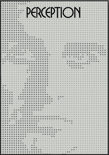
PERCEPTION
Advancing Knowledge in Multidisciplinary Perception StudiesPERCEPTION is a leading journal published by SAGE PUBLICATIONS LTD, focusing on the multidisciplinary aspects of perception across various fields, including Artificial Intelligence, Experimental and Cognitive Psychology, Ophthalmology, and Sensory Systems. With a commitment to advancing knowledge and fostering innovative research, the journal has been in circulation since 1972 and is recognized for its rigorous peer-review process and significant contributions to the academic community. Its current impact factor and Scopus rankings position it within the esteemed Q2 and Q3 categories, making it a valuable resource for researchers and professionals aiming to explore the complexities of human perception and its computational models. Although PERCEPTION does not offer open access, it provides essential insights and findings that are particularly relevant for students and academics in psychology, neuroscience, and artificial intelligence. Addressing cutting-edge topics, this journal serves as a vital forum for the exchange of research ideas and methodologies in the evolving landscape of perception studies, making it a crucial asset for anyone dedicated to understanding this intricate field.
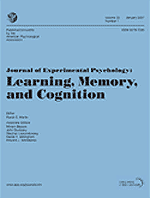
JOURNAL OF EXPERIMENTAL PSYCHOLOGY-LEARNING MEMORY AND COGNITION
Advancing the frontiers of cognitive science.JOURNAL OF EXPERIMENTAL PSYCHOLOGY-LEARNING MEMORY AND COGNITION is a premier publication of the American Psychological Association, focused on the intricate mechanisms of learning, memory, and cognition. Established in 1975, this esteemed journal has consistently delivered impactful research, evidenced by its Q1 ranking in both Experimental and Cognitive Psychology and Linguistics and Language categories for 2023. With an impressive impact factor and ranked in the top percentiles of multiple fields, it serves as a crucial resource for researchers, professionals, and students who aspire to deepen their understanding of cognitive processes. The journal’s rigorous peer-review process ensures that only the most innovative and high-quality studies are published, providing a platform for groundbreaking findings that advance the field. Though not open access, the insights within each issue are invaluable for anyone interested in the dynamics of human cognition and memory.
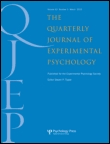
QUARTERLY JOURNAL OF EXPERIMENTAL PSYCHOLOGY
Bridging Theory and Practice in PsychologyQuarterly Journal of Experimental Psychology, published by SAGE Publications Ltd, is a leading peer-reviewed journal that serves as a vital resource in the fields of experimental and cognitive psychology, neuropsychology, and medicine. With an impactful contribution to psychological research, the journal is recognized for its rigorous methodology and empirical studies, holding a notable ranking among its peers—finding itself in the Q2 quartile across several categories. With its origin tracing back to 2006, Quarterly Journal of Experimental Psychology significantly influences the academic discourse until its latest published findings in 2024. Catering to a diverse audience of researchers, professionals, and students, this journal provides Open Access options, enhancing the reach and accessibility of cutting-edge psychological research. By focusing on innovative approaches and findings, it aims to bridge theoretical understanding with practical application, hence fostering advancement in multiple related disciplines. For those committed to understanding the complexities of human behavior and cognitive processes, this journal remains an essential reference point.

Avant
Unlocking Access to Transformative ResearchAvant is an esteemed academic journal published by the CENTRE PHILOSOPHICAL RESEARCH in Poland, dedicated to the interdisciplinary exploration of arts, humanities, cognitive neuroscience, and social sciences. Since its inception in 2010, Avant has embraced an Open Access model, providing researchers, professionals, and students with the opportunity to access and disseminate cutting-edge research freely. The journal currently holds a Q3 ranking in Arts and Humanities and a Q4 ranking in both Cognitive Neuroscience and Social Sciences, reflecting its commitment to fostering a diverse scholarly dialogue. With a focus on integrating various disciplines, Avant serves as a vital platform for innovative thoughts and ideas, enhancing its visibility evidenced by its rankings in Scopus. As the academic landscape continues to evolve, Avant remains a critical resource for those seeking to engage with contemporary issues across its thematic areas.

ACM Transactions on Applied Perception
Fostering Interdisciplinary Dialogue in Perception ScienceACM Transactions on Applied Perception is a leading journal published by the Association for Computing Machinery, focusing on the intersection of perception science and computational methods. With an ISSN of 1544-3558 and an E-ISSN of 1544-3965, this esteemed publication has been a vital resource for innovators and researchers since its establishment in 2004. It operates within the ambit of Computer Science and the realms of Experimental and Cognitive Psychology, boasting a commendable impact factor and category rankings, including Q2 in Computer Science (miscellaneous) and Q3 in both Experimental and Cognitive Psychology and Theoretical Computer Science. The journal's scope encompasses a plethora of studies aimed at understanding human perception through computational lenses, making it an essential platform for scholarly exchange. Although it does not currently offer an Open Access option, its extensive reach and rigorous peer-review process ensure high visibility and impact in the academic community. By fostering collaboration across disciplines, ACM Transactions on Applied Perception encourages advancements that bridge perceptual research with practical applications, making it invaluable for researchers, professionals, and students engaged in this dynamic field.

Cognitive Processing
Advancing the frontiers of cognitive science.Cognitive Processing, published by SPRINGER HEIDELBERG in Germany, is a leading journal dedicated to advancing the understanding of cognitive processes through interdisciplinary research. With its ISSN 1612-4782 and E-ISSN 1612-4790, the journal covers a diverse range of fields including Artificial Intelligence, Cognitive Neuroscience, and Experimental and Cognitive Psychology, making it an invaluable resource for researchers and professionals alike. While it currently does not operate under an Open Access model, it is well-regarded within the academic community, holding a respectable impact factor and ranking in the Q2 and Q3 quartiles as of 2023. The journal aims to foster innovation and collaboration among scholars, presenting high-quality original research, reviews, and theoretical discussions that bridge the gap between cognitive science and its practical implications. With a convergence of research from 2005 to 2024, Cognitive Processing continues to play a critical role in the evolving landscape of cognitive science literature.
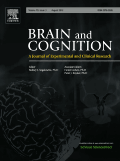
BRAIN AND COGNITION
Fostering Innovation in Cognitive ScienceBRAIN AND COGNITION, published by Academic Press Inc Elsevier Science, stands as a vital resource for researchers and practitioners in the realms of cognitive neuroscience and psychology. Established in 1982, the journal has continuously evolved, showcasing cutting-edge research that bridges the understanding of brain functions and cognitive processes up to 2024. With an impressive impact factor reflecting its commitment to high-quality scholarship, the journal currently holds a prestigious Q1 ranking in Arts and Humanities (miscellaneous) and notable Q2 rankings in various psychology fields, including Cognitive Neuroscience, Developmental and Educational Psychology, Experimental and Cognitive Psychology, and Neuropsychology. This multidisciplinary journal cultivates a rich academic dialogue, offering valuable insights to professionals, researchers, and students alike. Although it does not offer open access, its robust indexing in Scopus and consistent contribution to important discussions in cognitive research define its critical role in advancing knowledge and innovation in the cognitive sciences.

EXPERIMENTAL BRAIN RESEARCH
Unlocking the Mysteries of the Brain, One Study at a TimeEXPERIMENTAL BRAIN RESEARCH is a renowned journal published by SPRINGER, dedicated to advancing understanding in the field of neuroscience. With a history dating back to 1966, this journal offers valuable insights into the mechanisms of brain function and neurological disorders, making it a vital resource for researchers, professionals, and students alike. While it currently holds a Q3 classification in the field of Neuroscience (miscellaneous) and ranks #73 out of 113 in Scopus's General Neuroscience category, it continually contributes to fostering innovative research and collaborative dialogue. The journal is not open access, ensuring that although content is subscription-based, it maintains a high standard of peer review and scholarly rigor. By covering a breadth of topics relevant to both experimental and theoretical aspects of brain research, EXPERIMENTAL BRAIN RESEARCH serves as an essential platform for disseminating cutting-edge discoveries and theories in the dynamic realm of neuroscience.